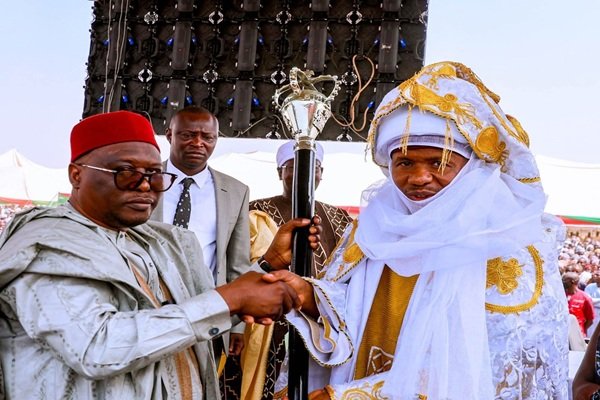Fufore Feud Flares: Fierce Legal Firestorm Engulfs Adamawa Over Creation Of New Emirate
Fufore Feud Flares: Fierce Legal Firestorm Engulfs Adamawa Over Creation Of New Emirate
…Tension and tradition collide in courtroom drama…
…As plaintiff witnesses present testimony; whether or not Fintiri-led government overreach the bounds of law and history in carving Fufore from the centuries-old Adamawa Emirate
The Periscope Global – Yola
A fierce legal storm has erupted before Justice Musa Usman of the Adamawa State High Court IV, as plaintiff witnesses took the stand in the high-stakes battle to quash the creation of the newly established Fufore Emirate Council.
The case, now one of the most closely watched traditional and constitutional showdowns in Adamawa State, pits three senior titleholders of the historic Adamawa Emirate against the state government and its newly installed Emir of Fufore.

At the heart of the dispute lies a burning question, did the Fintiri-led government overreach the bounds of law and history in carving Fufore from the centuries-old Adamawa Emirate?
The plaintiffs – Musa Halilu Ahmed (Dujima Adamawa), Alhaji Mustapha Dahiru Mustapha (Yeriman Adamawa), and Alhaji Mustapha Ahmad (Sarkin Noma Adamawa) – are challenging Governor Ahmadu Umaru Fintiri’s decision to create a separate emirate, alleging that it contravenes the Adamawa State Chiefs (Appointment and Deposition) Law and desecrates the cultural soul of the Adamawa Emirate.
Listed as defendants in the suit are the Adamawa State Government, Governor Ahmadu Umaru Fintiri, Attorney General and Commissioner for Justice, Afraimu K. Jingi and the Emir of Fufore, Muhammad Sani Ribadu.
Tension and tradition collide in courtroom drama: Inside the packed Yola courtroom, tension throbbed like a drumbeat. Four key witnesses for the plaintiffs, including renowned historian Professor Alkasum Abba, Dujima Adamawa Musa Halilu Ahmed, Sarkin Noma Mustapha Ahmad, and Umar Yahaya, Secretary of the Adamawa Emirate Council, were cross-examined by Chief LD Nzadon, counsel to the first, second and fourth defendants, alongside Attorney General Afraimu Jingi, who personally represented himself as the third defendant.
The air grew taut as sharp legal exchanges crackled between counsel; a courtroom symphony of objections, counterarguments and historical recollections.
The session brimmed with fiery brickbats and bursts of legal oratory, each side fiercely defending its version of tradition and legality.
Read Also: Governor Sule: A guiding light for sub-national development
When the gavel’s echo finally calmed the courtroom, Manga Nuruddeen (SAN), counsel to the plaintiffs, announced the closure of the plaintiffs’ case. Justice Musa Usman adjourned proceedings to November 3rd and 4th, 2025, when the defence will open its case.
“The Facts Are Clear,” Says Plaintiffs’ Counsel: Speaking to journalists outside the courtroom, Nuruddeen (SAN) hailed the day’s proceedings as a “significant milestone” in the pursuit of justice. “We’ve called our four witnesses and concluded our evidence today. The court has adjourned for the defence to bring their own witnesses.
“The plaintiffs have made a strong case. The government’s action violated established procedures and historical conventions. We are confident that justice will prevail,” he said.
He emphasised that the case was not merely about law but about preserving the legacy and lineage of Adamawa’s traditional institution.
Government Holds Its Ground::In his own reaction, Afraimu K. Jingi, the Adamawa State Attorney General and third defendant, expressed satisfaction with the pace and progress of the trial. “We have cross-examined the plaintiffs’ witnesses thoroughly to our satisfaction.
“The burden of proof lies squarely on the plaintiffs. We are confident in the legality of the government’s actions,” he said.
Responding to claims that the government ignored due process, Jingi dismissed the allegations as speculative. “It is the same witness who admitted he hasn’t read the law or the gazette. How, then, could he claim due process was not followed? These are matters for the court to decide,” he said with poise.
A Case Steeped in History and Power: Earlier, Justice Musa Usman had dismissed an application by the defence seeking to stay proceedings pending appeal, describing it as “frivolous and aimed at halting the cause of justice.”
The plaintiffs maintain that the government’s move to carve out Fufore Emirate was not only unlawful but politically motivated; a calculated attempt to dilute the authority of the Adamawa Emirate and alter the delicate tapestry of its traditional hierarchy.
The state government, however, insists the decision was taken within the ambit of the law, in furtherance of its policy to promote inclusiveness and decentralisation of traditional institutions.
As the case resumes next month, Adamawa watches with bated breath, a state torn between heritage and hierarchy, law and loyalty, politics and tradition.

